#a memoir to the dialogue of arcane
Explore tagged Tumblr posts
Text
guys i'm so sorry but "oinked poison" IS HILARIOUS
like i KNOW they're both MAD mad bc how do you not break at this 😭😭😭



(in her brain cait's already fucked her stupid)
((caitvi stop mentioning random animals challenge))
#i for real COULD NOT understand the words she was saying but i now know it's not my fault bc WHO SAYS OINKING POISON#WHO WROTE THIS SCENEEEEEEEEEE#rich unhinged mongoose#self-serving war pig#a memoir to the dialogue of arcane#if episode 8 doesn't make me cringe away from pleasant company for propriety's sake WHAT'S THE POINTTTTTTTT#caitvi#caitlyn kiramman#vi#arcane#arcane season 2#arcane spoilers#THIS IS FROM THE ACT 3 PREVIEW BTW#IT IS NOT A SPOILER. just watch the act 3 preview when it comes up at the end of episode 6
281 notes
·
View notes
Text
THE KEY TO HER HEART | Cassandra Kiramman

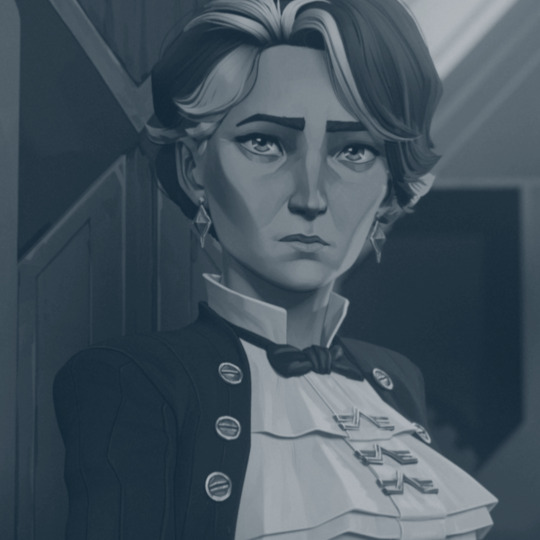
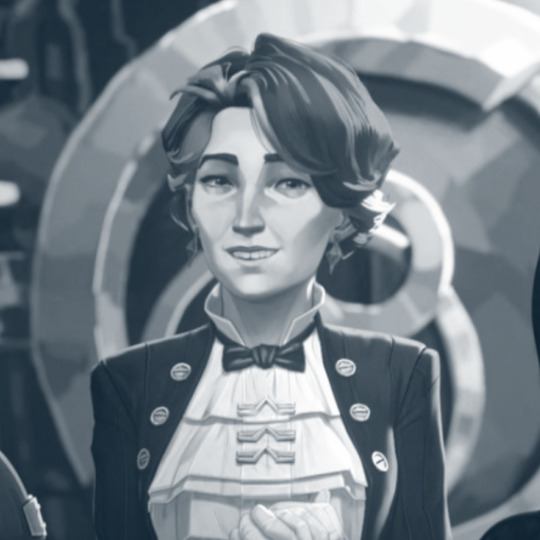
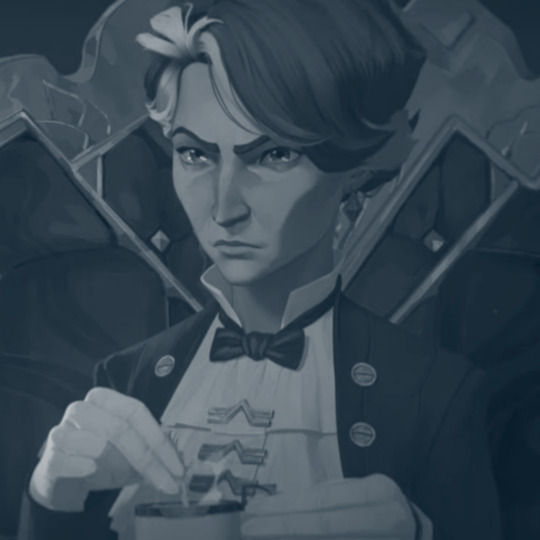

PAIRING: Cassandra Kiramman x Fem!Reader
CW: angst with a hopeful ending?, spoilers for season 2 act I, canon divergence, in Caitlyn’s pov, no dialogues (except one), mentions of death, mentions of reader being married to a man and having children with said man, mentions of pregnancy, mentions and implications of being in the hospital deathbed, tragic-ish love, 1950s Hollywood inspired in terms of homosexuality-ish, mentions of homophobia, back in the old day women are expected to marry a man, they kept their love for each other hidden until the end, reader is also a matriarch of her own family like Cassandra, most likely ooc Cassandra and Caitlyn
SUMMARY: Caitlyn receives the Kiramman Key to unlock knowledge privy to the Kiramman matriarchs. She also unlocks a memoir of her mother’s past, specifically with the person she loved the most through old photographs and unsent letters.
A/N: I realized a lot of my published work is composed of the “letter narrative” as I call it and this one has a bunch. It’s similar to my first Cassandra fanfic, the only difference is there’s death and grief involved. I have yet to finish the season, but her funeral and the memorial were hard to watch. I miss her so much.
A/N (12/11/24): Reading it while listening to “I Can’t Hear It Now” by Freya Ridings/Arcane on loop is a whole other experience...
WORDS: 2,669
(FANFIC IS UNDER THE CUT!)

When her father handed her the Kiramman Key her mother wanted her to have, Caitlyn knew she was truly gone. She was now the leader of House Kiramman too soon, without the guidance of her mother, Cassandra. It was a position she deemed unworthy of, but her mother reassured her of the merit of her birthright. Only when she thought her relationship with her mother would progress, the world decided to strip that opportunity from her.
Filled with grief, loss, and vengeance, especially after the attack at the memorial, Caitlyn decided to view what her mother had in store for her. First, it was the presentation of the ducts, the toxic air in the fissures contained by her mother’s instructions, allowing the people of The Undercity to breathe. She could use the passageways of the ventilation system and the Grey to locate Jinx, dismantle Shimmer, and neutralize any agents still loyal to Silco. Second, was a drawer of letters and photographs in a compartment at the bottom of the desk. It had nothing to do with the Kiramman Clan, but something to do with her mother’s personal life when she was younger.
The drawer seemed to be a memoir, maybe something left to be forgotten as dust covered its contents. Everything was held together with twine, completed with a battered tag, showing how old the letters and photographs were — possibly older than Caitlyn herself. She gently grabbed the bundle of memories in her hands, flipping the tag over to see what was written, the ink smudged by droplets. It wrote: My old love, in Cassandra’s handwriting. Her mother had a lover?
Caitlyn swore her breath hitched when she untangled the twine to reveal the secrets Cassandra carried. She wanted to see who her mother loved so much, that she had a collection of their time together, but she wasn’t expecting several photographs of you to appear. After all, you were her mother’s childhood friend, her closest companion and confidant.
It was clear in Caitlyn’s eyes that you two had a platonic relationship. Did she read it wrong? She saw you as an aunt, a second mother beside Cassandra; she never realized that her mother loved you romantically. This doesn’t make sense. You had a husband and children of your own, just like her mother. You and Cassandra would get together and gossip about your spouses and children. She had proof, she had accompanied you two when she was a little girl on several occasions. What did Caitlyn miss? What was kept hidden?
Did her mother love you more than her own husband? What about you? Did you love Cassandra too? Caitlyn flickered through the photographs, putting the letters aside for later, it was clear her mother was devoted to you. She never imagined her mother would ever use a camera to capture your beauty throughout your shared life. It felt uncharacteristic of her to do so, to have her mother be deeply in love with someone other than her father.
Now that she thought about it. It seemed like Cassandra changed when you passed away. Gone was the warmth she wore on her sleeves as she became distant and even more stubborn, pretentious, and selfish, perfecting her façade as a politician. She now realized how her mother tried to tone down her grief during your burial, to appear as if she only lost a good friend. Caitlyn was too entangled in her own emotions of also losing you to realize how deeply your sudden death affected her mother. She was still too young to comprehend how you died, Cassandra never told her. It was too painful to recount.
Maybe all this time, Cassandra was still grieving your loss till the day she died, having failed to protect you and prevent your death, so much so that her efforts were transferred onto Caitlyn so she could avoid the same fate. She started to understand her mother’s actions a little more, not that she condoned them after the seclusion and restriction she felt all her life. Her mother meant well, even if it hurt. Cassandra didn’t want to lose Caitlyn as she lost you.
After observing each photograph, soon came the letters. Caitlyn skimmed from the oldest letter at the bottom pile to the newer ones at the top. These words were never meant to see the light of day, never meant for someone else to see, especially not you or an outsider like Caitlyn. She can’t believe how raw the emotions she felt from her mother’s words. Caitlyn cannot do justice to her mother’s letters by explaining their contents. You simply had to read them to feel Cassandra’s love for you, but you were gone, unaware that your dearest friend saw you as her whole world even if she could not display her heart at her sleeves due to the societal expectations in the past.
Caitlyn saw smears of ink in many places, making it hard for her to comprehend the smudged words, but she knew her mother cried writing and possibly reading them. These letters were a diary, a collection of paper with words akin to a symphony of her love for you. Caitlyn wondered if you were aware of Cassandra’s feelings and simply did not comment on it, or if you and her mother shared the same situation, loving each other in the shadows as your respective families were in the spotlight of attention.
Was writing letters something Cassandra did in her free time? Because there were so many, it would take Caitlyn some time to skim through all of them. It felt like an invasion of privacy, but maybe her mother wanted someone to know her feelings unless this parcel was supposed to be discarded before Caitlyn took over as the Kiramman Clan Matriarch. Still, Caitlyn couldn’t help but go through it, you meant a lot to her too, and she felt the connection between you two that had faded since your death years ago. The world had taken you and her mother too early, Caitlyn only had her father left, hoping his grief for Cassandra wouldn’t make his life wither and leave her too.
The letters started with Cassandra realizing she loved you; appreciating your beauty from inside and out. She expressed in detail the moment she knew she was in love, from how her heart threatened to beat out of her chest as your hair blew in the wind, the purple petals from the grand ivory-barked tree swayed with you. Caitlyn recognized it was the sacred place she and her mother shared near the fountain on the outskirts of the city, a place where they never argued and remembered your presence together.
“...We went to the place you enjoyed the most, Y/n. I came to share your love for this park because you were always there with me. I never thought you would take my breath away like you had today. You were beautiful, you have always been.
Today felt different, however. The sight before me was something that came out of books. The wind picked up and your hair danced with the purple petals that floated around you. Your smile directed at me made it seem like I was in a fairytale my mother used to tell me as a child. It was a sight to behold, and I knew then and there, that I had fallen in love with you...”
The following letters were short, but filled with admiration and love. Cassandra appreciated you in many ways Caitlyn never knew in each letter, expressing her appreciation for everything you did, your character, appearance, and how you treated her. Her mother was so youthful, so happy whenever she was with you. It broke Caitlyn’s heart when the letters started to take on another tone; one of loss and hopelessness.
“...Why must society be this way, my love? Why am I prohibited from loving you the way you deserve? I am shackled by these expectations placed upon me, and I’m ashamed that I have to hide in the dark to be able to express my love. I’m a coward for not throwing everything away so I could love you publicly. I wish to have you by my side, to call you my lover, my beloved wife, without the consequences of society. I was overjoyed when I realized you loved me too, but it pained me that you were also hiding your love. You were as careful as I was with concealing how we felt for each other. Do you know that I love you too? I wish for you to know, but I’m scared of putting you in danger.
I wouldn’t know of your feelings if not for the day my parents announced my engagement. You had shown a crack of your true self from your poised façade. It pained me to see the sullen expression on your face. You tried to hide your turmoil, but I knew the news broke you as much as it did me. I wanted to cup your face and hold you in my embrace, to feel your warmth against mine as I whispered words of love, saying that we would still have each other as our duties befall us.
I wanted to kiss your troubles away, but I did not let myself get carried away with such intimacy. Any hint of something more as friendship in anyone’s eyes would lead to forced separation… I don’t want to lose you. I’m sorry, Y/n, but I need to build distance between us to avoid suspicion. Please forgive me… I despise myself for being powerless to protect you from the pain I would cause you…”
Caitlyn read the following letters, Cassandra expressed her guilt for keeping you at arm's length when all she wanted was to have all of you, to be with you the way you both wanted, but such a thing never happened when the two of you started your own families. She apologized in many letters as she realized how you started to pull away from her. Caitlyn tried her best to decipher the smudged words that filled the loose paper. Her mother didn’t want this, didn’t want to pretend she felt nothing for you other than a platonic friendship, that she didn’t love you. It was cruel.
There was a large time gap between the letters. Caitlyn decided that her mother tried to focus on her duties as the Kiramman Matriarch and her relationship with Tobias by severing her attachments to the letters. Cassandra must’ve been carrying Caitlyn somewhere during this time, not wanting the memory of your relationship with her to cause stress and emotional turmoil during her months of pregnancy.
The letter that followed was something close to reconciliation even if the distance was still there. You and Cassandra must’ve accepted the fate of your separated lives and decided to continue what was remaining of your friendship. Caitlyn was surprised she was the catalyst of this event.
“...I was nervous about meeting you again after months of no contact, Y/n. I didn’t know what to expect after you distanced yourself from me. I still remember the pained expression on your face when I told you we shouldn’t see each other anymore. I never hated myself so much for being the cause of your pain. I have never done anything but hurt you. So, I was in disbelief when you easily agreed to the invitation I sent out of the blue to meet Caitlyn.
You must’ve laughed at my audacity for wanting you back after pushing you out of my life, that you only agreed to this because your kind husband convinced you so. I hate to say I’m relieved you have wedded a respectful man. I know you are safe in his hands when I can’t be there to do the same.
I was faced with an impassive demeanor when you arrived at the Kiramman residence, and I didn’t know if our friendship could be salvaged, but when you held Caitlyn, I saw a glimmer of love shine in your eyes. The smile that broke from your façade when you cradled my daughter with so much care made my heart swell at the sight. Then you met my gaze, and it felt like that day in the park all over again. I knew I was still in love with you, and you felt the same, even as our love dwelled in pain and loss because of the world we live in…”
The last letter on the pile was tattered compared to the other ones. It was difficult to understand because of the ink smudges, shaky handwriting, and teardrops… Caitlyn knew what this letter was about and could see how her mother struggled to write this one. The unshakeable grief that filled this page hurt Caitlyn. This must’ve been the fork Cassandra faced when she decided that writing more letters would only cause her more pain than solace as she thought about you.
“...I failed you, my love. I failed to protect you from your curiosity and compassion for The Undercity. The world was too cruel to take you from me, our relationship had only begun to blossom its fruits. The time we spent rebuilding what was lost… How could I sleep at night, knowing I could’ve prevented your death? I will never be able to live with the guilt of hurting you even until your last breath.
I should’ve listened to you, I should’ve been more open-minded about creating the ventilation system for people of the fissures. Was this the world’s response to my selfishness, to take you away from me? I feel so empty without you, the grief is tearing away at me. I couldn’t bear hearing Caitlyn’s cries when I told her you would no longer be with us to spoil her, to love her like your own.
Everything that happened to you is all my fault. No amount of apologies would bring you back, but I am so sorry, Y/n. The Grey I could’ve contained with my influence and resources ate at your life, poisoned your lungs, and I couldn’t do anything to stop it.
It tore at my heart to see you fighting for your life, hooked to machines, but everything was a lost cause when the grip of your hand on mine loosened and lay limp between my own. Your eyes became distant and empty as the light in them faded, but you still held the smile I fell in love with, muttering the words I longed to hear for decades: ‘I love you, Cassandra.’ I couldn’t respond in time, I failed to say that I love you too… because you were already gone…
I promise I will let the people of The Undercity breathe, just as you had wished, my love…”
Caitlyn now understood why her mother completed the project. She did it for you. It was a grand and equally dangerous project that took many lives and resources to complete, and here Caitlyn was, planning to unleash the gas that killed you to look for a criminal who killed her mother and many others.
After reading the letters, Caitlyn wondered several things. Would her mother be happy again, now that she has reunited with you in the afterlife? Would she be able to express her love after hiding her true feelings for you for so long? Caitlyn hopes she can because she knows how much her mother was alive when you were around, even in moments of joy and sadness. She wanted her mother to be happy again despite the pain in her heart that she was no longer there with her and her father.
.
.
.
Meanwhile…
“I finally got to see you again, my love… Oh, how I missed you so… My life was never the same when you left… I can’t believe you’re back in my life… and in my arms… I love you too, Y/n… I love you so, so much, dearest.”

© shenachigans — do not plagiarise, translate, repost, or copy.
#arcane#arcane cassandra#cassandra kiramman#cassandra kiramman x reader#arcane x reader#league of legends#arcane netflix#arcane women#cassandra x reader#arcane league of legends x reader#arcane league of legends#arcane season 2#arcane s2#caitlyn kiramman#caitlyn arcane#cassandra arcane
458 notes
·
View notes
Text
Hey gang can I get some Fantasy For Grown-ups recommendations (especially if they're available in audiobook format but NOT audible exclusives bc I use Libby)? I've been listening to a lot of T Kingfisher's fantasy lately all of which centers around grown ass adults but keeps a lot of the things I loved about fantasy growing up: fun and creative worldbuilding, competent protagonists, humour and clever dialogue, and intriguing narrative. I also like Pratchett, especially the Watch set and the Witches. I like stories that feel like they could conceivably have been a Dungeons and Dragons campain, or are subversions of a traditional fairytale. I don't mind romance subplots (as long as they're established well and don't feel tacked on because the author felt obligated) but I'm not one for Romance Novels specifically, which is why I don't use the term Adult Fantasy because for some reason people take that to mean porn with some dragons thrown in. I'm definitely up for some Sci-Fi or Mystery in my fantasy, too!
Current TBR:
Ancillary Justice by Ann Leckie
Jonathan Strange and Mr Norrel by Susanna Clarke
The City of Brass by S. A. Chakraborty
Uprooted by Naomi Novik
Thursday Murder Club by Richard Osman
Books I loved:
T Kingfisher
Nettle & Bone
Swordheart
Bryony and Roses
Thornhedge
Saint of Steel series
Other authors/works
The Watch Cycle (Terry Pratchett) and other Discworld
The Queen's Thief series by Megan Whalen Turner
Lamb by Christopher Moore
The Wolf and the Woodsman by Ava Reid
16 Ways To Defend A Walled City by K J Parker (and sequels)
The Abhorsen series by Garth Nix
The Lies of Locke Lamora (currently reading) by Scott Lynch
Reforged/Reborn Duology by Seth Haddon
Babel by R. F. Kuang
The Memoirs of Lady Trent series by Marie Brennan
Books I liked as a kid that are in the same vein
Redwall by Brian Jacques
Lockwood & Co by Jonathan Stroud
Everything by Rick Riordon
The Fablehaven series by Brandon Mull
TV Shows, Films, & Video Games with similar energy that I enjoy
Leverage
Star Trek
Baldur's Gate 3
The Witcher: Wild Hunt
Mass Effect
Classic Ghibli
Arcane
Please don't recommend anything by Sarah J Maas, Brandon Sanderson, or Leigh Bardugo, I've already got the big names on the list.
115 notes
·
View notes
Text
The Murder Artist: Alfred Hitchcock At The End Of His Rope by Alice Stoehr

“Rope was an interesting technical experiment that I was lucky and happy to be a part of, but I don’t think it was one of Hitchcock’s better films.” So wrote Farley Granger, one of its two stars, in his memoir Include Me Out. The actor was in his early twenties when the Master of Suspense plucked him from Samuel Goldwyn’s roster. He’d star in the first production from the director’s new Transatlantic Pictures as Phillip Morgan, a pianist and co-conspirator in murder. John Dall would play his partner, homicidal mastermind Brandon Shaw. Granger had the stiff pout to Dall’s trembling smirk.
The “interesting technical experiment” was Hitchcock’s decision to shoot the film, adapted from a twenty-year-old English play, as a series of 10-minute shots stitched together into a simulated feature-length take. This allowed him to retain the stage’s spatial and temporal unities while guiding the audience with the camera’s eye. In the process, he’d embed a host of meta-textual and erotic nuances within the sinister mise-en-scène. Screenwriter Arthur Laurents (Granger’s boyfriend, for a time) updated the play’s fictionalized account of Chicagoan thrill killers Leopold and Loeb to a penthouse in late ‘40s Manhattan. There, Phillip strangles the duo’s friend David—his scream behind a curtain opens the film—immediately prior to a dinner party where they’ll serve pâté atop the box that serves as his coffin. It’s a morbid premise for a comedy of manners, and Brandon taunts his guests throughout the evening. (Asked if it’s someone’s birthday, he coyly replies, “It’s, uh, really almost the opposite.”)
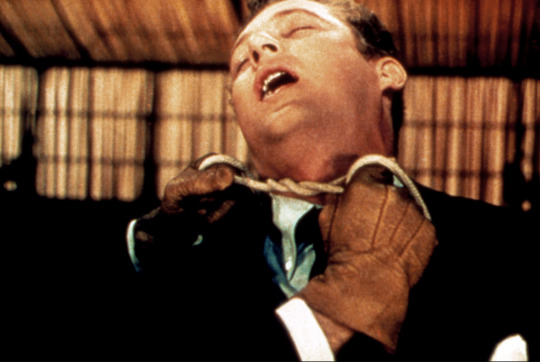
Granger deemed the film lesser Hitchcock due to two limitations. One was the sheer repetition and exact blocking demanded by its formal conceit, the other the Production Code’s blanket ban on “sex perversion,” which meant tiptoeing around the fact that Brandon and Phillip—like their real-life inspirations and, to some degree, Rope’s leading men—were gay. That stringent homophobia forced Hitchcock and Laurents to convey their sexuality through ambiguity and implication; the director would use similar tactics to adapt queer writers like Daphne du Maurier and Patricia Highsmith. (“Hitchcock confessed that he actually enjoyed his negotiations with [Code honcho Joseph] Breen,” notes Thomas Doherty in the book Hollywood’s Censor. “The spirited give-and-take, said Hitchcock, possessed all the thrill of competitive horse trading.”) The nature of the characters’ relationship is hardly subtext: Rope starts with their orgasmic shudder over David’s death, then labored panting after which Brandon pulls out a cigarette and lets in some light. A few minutes later, Brandon strokes the neck of a champagne bottle; Phillip asks how he felt during the act, and he gasps “tremendously exhilarated.”
Like Brandon’s hints about the murder, the homosexuality on display is surprisingly explicit if an audience can decode it. The whole film pivots around their partnership, both criminal and domestic. In an impish bit of conflation, their scheme even stands in for “the love that dare not speak its name,” with David’s body acting as a fetish object in a sexual game no one else can perceive. The guests, as Brandon puts it, are “a dull crew,” “those idiots” who include David’s father and aunt, played by London theater veterans Cedric Hardwicke and Constance Collier. Joan Chandler and Douglas Dick, both a couple years into what would be modest careers, play David’s fiancée Janet and her ex Kenneth. Character actress Edith Evanson appears as housekeeper Mrs. Wilson, a prototype for Thelma Ritter’s Stella in Rear Window, and a top-billed James Stewart is Rupert Cadell, who once mentored the murderers in arcane philosophy.
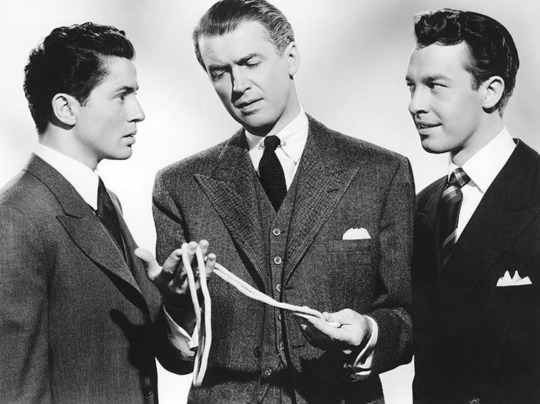
This was the first of Stewart’s four collaborations with Hitchcock. It cast the actor against type not as a romantic hero but as an observer and provocateur, his gaze shrewd, his dialogue heavy with irony. The role presaged his work in the ‘50s, with Mann rather than Capra, emphasizing psychology over ideology. Rupert, like L.B. Jeffries or Scottie Ferguson, is rooting out a crime, and in so doing comes to seem more loathsome than the villains themselves. “Murder is—or should be—an art,” he lectures midway through Rope, eyebrow arched, martini glass in hand. “Not one of the seven lively perhaps, but an art nevertheless.” Half an hour in real time later, having seen David’s body, he flies into a moralizing monologue: “You’ve given my words a meaning that I never dreamed of!” It takes up the last several minutes of the film, with Rupert snarling from deep in his righteous indignation, “Did you think you were God, Brandon?”
Stewart was a master of sputtering, impassioned oratory, and his facility for it renders Rupert’s hypocrisy especially stark. He taught these murderers; he can’t just shrug off his culpability. The Code decreed that “the sympathy of the audience shall never be thrown to the side of crime, wrongdoing, or sin.” Every transgression reaps a punishment. The ending of Rope abides by the letter of this law, as Rupert fires several shots into the night, drawing a police siren toward the building. He sits, deflated, while Phillip plays piano and Brandon has one last drink. But none of David’s loved ones get to excoriate his killers. The one man here with no integrity, no moral authority, is the one who gets the final, self-flagellating word.

The Code forbade throwing sympathy to the side of sin, but if Hitchcock meant any character in Rope as his stand-in, it was Brandon, not Rupert. The top to Phillip’s bottom, he’s the director of the play within a film. He’s storyboarded it to perfection. Janet, realizing he’s toying with her, cries that he’s incapable of just throwing a party. “No, you’d have to add something that appealed to your warped sense of humor!” Hitchcock, who’d built a corpus of corpses, must have gotten a chuckle from that line. Whereas Phillip fears discovery, Brandon puts symbolism above pragmatism, prioritizing what Phillip dubs his “neat little touches.” He needs to have dinner on the chest, the murder weapon tied around antique books, and his surrogate father Rupert in attendance, much as the film’s director needed to shoot in long takes—not because it’s pragmatic, but because it’s beautiful. He went to great lengths for verisimilar beauty here, as Steven Jacobs details in The Wrong House: The Architecture of Alfred Hitchcock. Miniatures in the three-dimensional cyclorama seen through the broad penthouse window were wired and connected to a ‘light organ’ that allowed for the gradual activation of the skyline’s thousands of lights and hundreds of neon signs. Meanwhile, spun-glass clouds were shifted by technicians from right to left during moments when the camera turned away from the window.
Jacobs notes as well that a painting by Fidelio Ponce de León hanging on Brandon and Phillip’s wall actually belonged to the director and had previously hung in his own home. Rope is avant-garde art wrapped in a bourgeois thriller, about avant-garde art wrapped in a dinner party, pushing moral and aesthetic boundaries while collapsing any distinction between the two. In this nested construction, Brandon the murder artist becomes a figure of auto-critique or perhaps apologia. Did you think you were God, Alfred? By 1948, he’d already made dozens of films, often obliquely about sex and violence, across decades and continents. He’d become the world champion sick joke raconteur. Rope is a reckoning with the ethics of his genre.
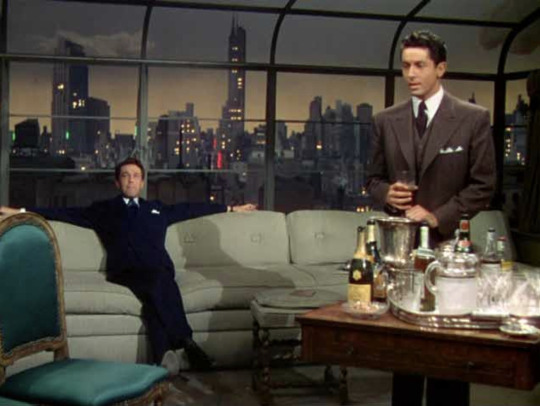
By 1948, the world had changed. A few years earlier, Hitchcock’s friend (and Rope co-producer) Sidney Bernstein had asked him to advise on a film about Germany’s newly liberated concentration camps. As Kay Gladstone writes in Holocaust and the Moving Image, Hitchcock worried that “tricky editing” would let skeptics read its footage as fraudulent and asked the editors “to use as far as possible long shots and panning shots with no cuts.” The director took his own counsel to heart.
Rope was also his first color film, the start of his fascination with dull palettes. (A quarter-century later he’d limn Frenzy’s London with every shade of beige.) Genteel browns and grays dominate the penthouse, the hues of men’s suits. Only after nightfall does the apartment glow with, in Jacobs’ phrasing, “the expressive possibilities of urban neon light.” The dinner party takes place at the crest of postwar modernity, a world away from the camps. Here, among the East Coast intelligentsia, murder’s merely a thought experiment. When David’s father mentions Hitler, Brandon dismisses him as “a paranoiac savage.” Yet even in polite society, the evening can begin with a secret killing and end with that iniquity brought to light. “Perhaps what is called civilization is hypocrisy,” says Brandon. “Perhaps,” David’s father concedes.
In 1948, the world was changing. That year saw the publication of Gore Vidal’s landmark gay novel The City and the Pillar and the first of the Kinsey Reports. Antonioni was a documentarian about to make his first feature; Truffaut was a delinquent catching Hitchcock movies at the Cinémathèque. Rope’s amorality and pitch-black humor augur a world and a cinema that were yet to come. It’s thorny gay art through a straight auteur. The film’s last thirty seconds show Rupert’s back to the camera while Brandon sips his cocktail and Phillip plays a tune, the trio lit by flashing neon. In this denouement lie decadence and damnation, art and death, the Code-closeted past and a disaffected future.
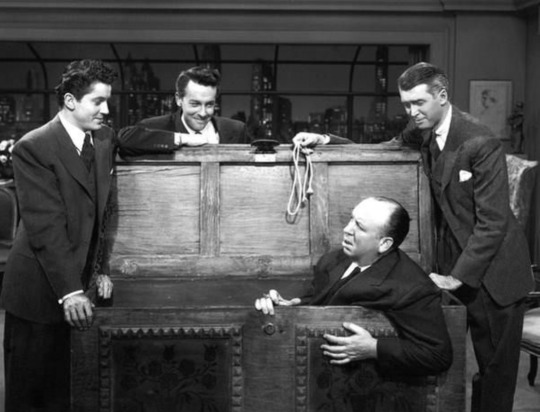
#alfred hitchcock#rope film#rope movie#hitchcock#james stewart#farley granger#john dall#gore vidal#michelangelo antonioni#francois truffaut#frenzy film#the wrong house: the architecture of alfred hitchcock#musings#film writing#film essay#oscilloscope laboratories#o-scope labs#adam yauch#Beastie Boys
53 notes
·
View notes